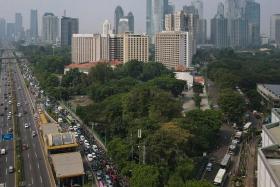Businesses here must think internationally in risk approach
Many S'pore executives don't have continuity plans for external catastrophic events
In the 2017 Executive Opinion Survey by the World Economic Forum, Marsh & McLennan Companies and Zurich Insurance Group, business leaders in Singapore voted terrorism and cyber attacks as the biggest global risks.
Out of 136 countries surveyed, Germany and the United States were the only other countries to rank these in the top two.
In contrast, similar to last year, the top five risks identified overall by more than 12,400 executives surveyed globally were high unemployment, energy price shocks, fiscal crises, national governance failure and social instability.
The results send a clear message that Singapore businesses are more concerned about international risks than home-grown pressures and reaffirm Singapore's position as an oasis of stability in the region, and highlights vulnerabilities.
From the survey, Singapore had the most in common with other advanced economies and markets where global financial centres, corporate headquarters and technological hubs exist.
Many of the world's most digitally and financially interconnected economies such as the US, Singapore, Switzerland and Germany see large-scale cyber attacks and terrorism in their top five risks.
Cyber or terrorist attacks in these countries can have serious economic impact locally and globally.
Terrorism is a hot-button issue for the US and other Western nations, but in recent years, Singapore has - according to the Ministry of Home Affairs - also been "under the highest threat level it has ever been", with potential attacks anticipated and uncovered after the country was specifically targeted by terrorist groups.
This is compounded by the state of affairs in other Asean countries.
Singapore's neighbours have experienced a growing threat of attacks with instability in the Philippines, Myanmar, Bangladesh and even Malaysia.
From the siege of Marawi to the escalation of racial tensions and insurgency in Myanmar's Rakhine State, terrorist groups have a clear foothold in the region.
In the past year, awareness of the risk of cybercrime has also proliferated from high-profile and disruptive instances such as the Swift bank hacking, corporate data theft and ransomware attacks.
The Government has recognised this threat and introduced multiple initiatives such as the launch of the Cyber Security Agency of Singapore (CSA) in 2015, and conducts programmes such as Exercise Raffles, a large-scale, industry-wide financial centre exercise that simulates terrorist and cyber attacks.
It was therefore reassuring earlier this year when the CSA reported that no government agencies or critical information infrastructure were affected by the WannaCry virus that hit more than 100 countries.
LEARNING FROM EXPERIENCE
Another clear theme from the survey is that the Singapore findings are deeply shaped by experience.
While unemployment was rated the number one perceived risk globally in the past two years, it received a low ranking in Singapore where unemployment has historically been low.
Figures from the Ministry of Manpower show that in the past decade, Singapore has kept unemployment at or around 2 per cent.
This contrasts with figures such as 26.6 per cent in South Africa or 17.6 per cent in Spain, and is lower than international standards for developed countries, which average 5 per cent to 10 per cent.
Singapore was also the only country surveyed to rank the risk of infectious disease in its top five.
This may be due to the Republic's experience with severe acute respiratory syndrome in 2003 and more recently, outbreaks of the Zika virus and bird flu.
Amid an increasingly risky global business environment, it is crucial that Singapore's executives think internationally in their risk approach.
While most have plans for managing local risks, fewer will have business continuity plans for external, catastrophic events such as a cyber or terrorist attack.
Even though the probability of these events is undoubtedly lower than everyday risks such as damage to property or staff issues, the effects can be far more severe.
Looking ahead, as globalisation trends continue to build more connected infrastructure and economies, we expect the threat of global risks to markets such as Singapore to only amplify further.
Businesses must be prepared to manage these disruptions because it is most likely not a question of if they will happen but when.
The writer is chief executive officer of Zurich Insurance Singapore. This article was published in The Business Times on Oct 27.
Get The New Paper on your phone with the free TNP app. Download from the Apple App Store or Google Play Store now



